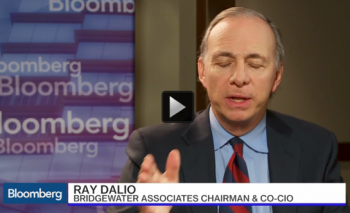
Dalio
Ray Dalio of Bridgewater Associates is regarded as the most successful hedge fund manager of all time. And he has a way of thinking about the world that has helped his clients navigate the vicissitudes of the market with such skill they have entrusted $186 billion to Bridgewater.
In essence, according to Dalio, it’s all about productivity and the idea that you can only spend as much as you earn. The caveat is that there’s two debt or credit cycles. The short-term cycle which is similar in length to the business cycle, last eight to ten years (although in this video he says it lasts five to eight years), and allows individuals to spend more than they earn over a short period but then requires repayment – a period during which individuals must necessarily spend less.
The long-term cycle lasts 50 to 75 years when we have reached the limits to spending growth financed by a combination of debt and money. In other words too much debt relative to income means that even zero interest rates are ineffective at stimulating demand.
According to Dalio, “We are seven years into the expansion phase of the business/short-term debt cycle and near the end of the expansion phase of a long-term debt cycle, which typically lasts about 50 to 75 years.”
In this video recorded on 4 March, 2016 Dalio explains why the dynamics of the long-term debt cycle are the reason for the global economic weakness, and the deflationary pressures being experienced today, that in turn justify a lower interest rate from the US Federal Reserve rather than a tightening. He also defines the “pushing on a string” metaphor offered to label the ineffectiveness of the final phase of Quantitative Easing.
We don’t recommend many third party videos but this one is worth half an hour of your time. You will probably emerge with an appreciation of the serious risks associated with the idea that interest rates should normalise (rise) any time soon.
You can watch the full video here.
Roger Montgomery is the founder and Chief Investment Officer of Montgomery Investment Management. To invest with Montgomery domestically and globally, find out more.
Mark Egan
:
Here’s Ray Dalio’s economic machine video that I found very helpful.
https://www.youtube.com/watch?v=PHe0bXAIuk0
I wish that interviewers would stop interupting him though. Like a lot of very smart people he has a habit of pulling ideas into a sentence from left field so listen to him carefully!
Dennis
:
I’ve had a similar discussion with a colleague 6 months ago.
Debt repayment is part interest part principal. Nothing revolutionary in that statement. What happens if everyone’s cash flow goes towards paying back debt, even where interest rates are zero? Interest rates drop to free up cash flow. However, there may come a point where interest rates are zero but people need to use all of their cash flow to make 100% principal repayments. Interest rates drop, asset prices increase which requires a higher level of debt. Interest rates drop again which further inflates asset prices. And so on. It is especially madness where there is little underlying increase in the earnings power of the asset!
Wages growth or earnings growth is required to service increasing debt. But what if the wages & earnings growth is not keeping pace with debt repayment growth?
In my humble opinion, debt is not a safe way to grow a business, nor is it a safe way to grow an economy. How many times has a company or an economy gone on a debt fuelled expansion and gone bust not long after. Debt can juice returns, but debt can also quickly turn on you.
Luke
:
What a great video. The most noteworthy part for me is that he seems to be far less bearish on China’s debt situation than George Soros or Kyle Bass and he is not even sure that a big devaluation in the yuan would be required!